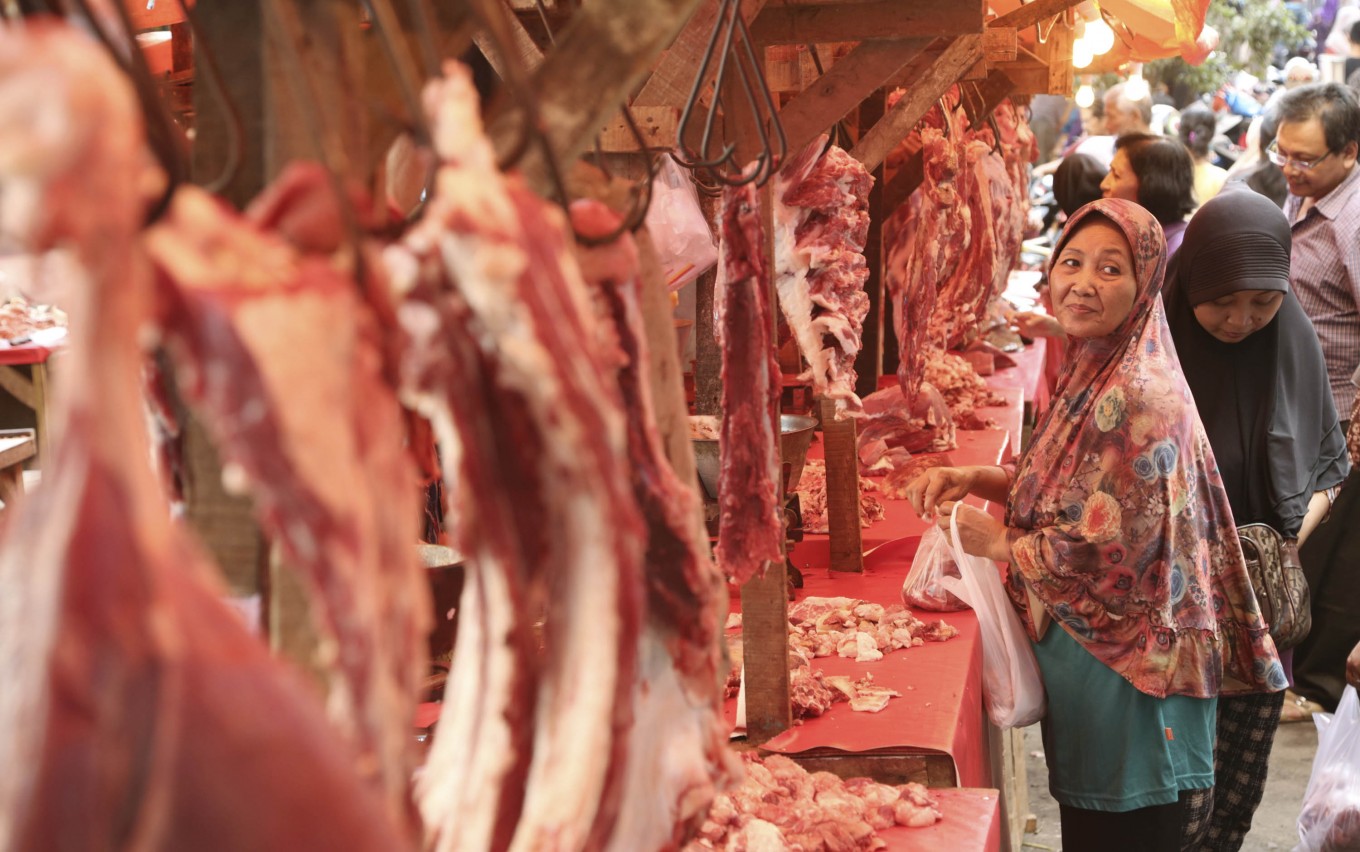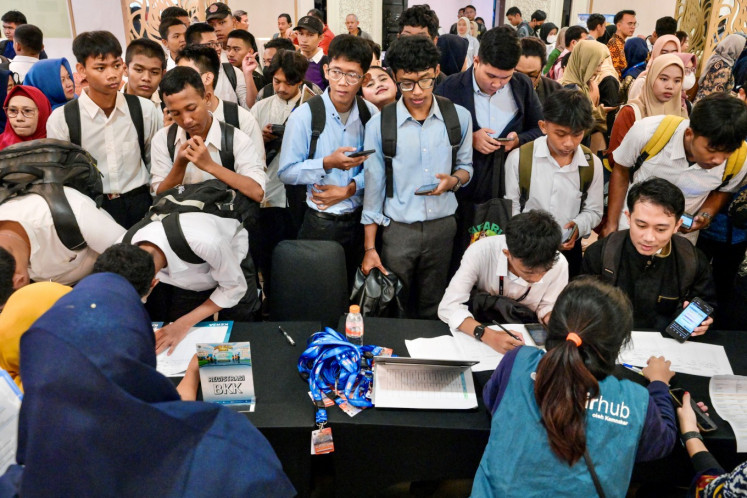Popular Reads
Top Results
Can't find what you're looking for?
View all search resultsPopular Reads
Top Results
Can't find what you're looking for?
View all search resultsFood consumption: What's wrong with eating meat?
The environmental impact is most likely caused by the way we raise plants and animals. In the same way, health problems are sparked by the way we process food and the amount of the food that we eat.
Change text size
Gift Premium Articles
to Anyone
 A Muslim woman shops for meat during the last few days of the holy fasting month of Ramadan at a market in Jakarta, Indonesia, Monday, July 4, 2016. Indonesians flock shopping malls and markets in the capital as they begin to shop in preparation for Eid al-Fitr, a celebration that marks the end of the Muslim fasting month of Ramadan.
(AP Photo/Achmad Ibrahim)
A Muslim woman shops for meat during the last few days of the holy fasting month of Ramadan at a market in Jakarta, Indonesia, Monday, July 4, 2016. Indonesians flock shopping malls and markets in the capital as they begin to shop in preparation for Eid al-Fitr, a celebration that marks the end of the Muslim fasting month of Ramadan.
(AP Photo/Achmad Ibrahim)
E
very time I check my social media timeline, photos of food and beverages are the most common posts. Friends take photos of their food before eating their meals. I took a closer look at every single photo and found that meat was one of the most popular dishes.
More and more people are eating steak, beef burgers and meat-lover pizzas. Meat has become part of society, a sign of an urban lifestyle that indicates the rise of the middle-income sector. With all respect to vegans and vegetarians, meat is part of human history.
We have eaten meat since the hunter-gatherer era. Now, 90 percent of the world’s population eats meat. Demand for meat will double in the next decades. Beef consumption in Indonesia was approximately 613,110 tons in 2015 and is estimated to grow to 642,760 tons by 2019.
The flip side of the coin is growing demand for meat, followed by growing awareness of the negative effects of meat production and consumption. Meat is not only touted as the biggest cause of global warming through greenhouse gas emissions but also linked to cancer and other dangerous diseases.
Meat does not have a good impression in the green community, with environmentalists or animal lovers. Meat may be not as bad as plastic bags or cigarettes, but meat has tended to become seen as one of many environmental problems. The meatless movement and stop-eating-meat campaigns have grown widely in some countries.
The opinion piece by Reidinar Juliane and Satrio A. Wicaksono in The Jakarta Post (Sept. 25) entitled “Why sustainable diets are a big deal for humanity?” explained the concerns of a food gap. This gap, as stated in their piece, is partly induced by the fact that global food consumption patterns are shifting toward affluent, urban diets.
The writers said: “One action people can take to help address this food gap in a sustainable way is to reduce consumption of resource-intensive foods, such as animal-based foods, particularly beef, while increasing the intake of plant-based foods”.
I appreciate the attention of Juliane and Wicaksono on sustainable food. I agree with their thoughts about the importance of a sustainable diet. They state the benefits of sustainable food on the environment and our wellbeing.
In my point of view, efforts to reduce the food gap and achieve sustainable food must take place in all food chains. Reducing consumption of animal-based foods, particularly beef, is not a good way to fix the system. It is not easy to tell people what to eat or what not to eat, we will certainly face social and economic barriers.
I will not put myself into the debate of a meat advantage or disadvantage. But we can’t ignore and forget the nutritional benefits of meat. Telling people to reduce their meat consumption will eliminate the chance for people to benefit from meat’s nutritional value. In other words, there are many reasons to avoid meat but also lots of reasons to embrace meat.
We need a wider perspective to understand the food system as a whole, and what has gone wrong. The environmental impact and health problems from meat are caused by the way we produce meat, how we raise cattle, how we cook meat and how much meat we eat. Meat itself is a source of animal-based protein, essential amino acids and iron.
All foods that are over consumed are risky. Eating moderate amounts of well-prepared meat will have a low negative impact on our health.
So, are plant-based foods safe, healthy? It depends on how we produce and treat the plants. Plant-based foods can become harmful when grown in an unsupervised manner and with the use of dangerous chemical pesticides or fertilizers. Some synthetic fertilizers also produce greenhouse gases.
To achieve sustainable food, we need to shake things up. We have to shift our way of farming. Good Agricultural Practices (GAP) must be put into effect. The environmental impact is most likely caused by the way we raise plants and animals. In the same way, health problems are sparked by the way we process food and the amount of the food that we eat.
Sustainable livestock farming to produce meat is more reliable then reducing meat consumption. There are some cattle grazing and feeding systems that can reduce greenhouse gases and enrich the soil.
We can also practice animal welfare when handling farm animals. Yes, it’s not an easy task, but we can do it, one step at a time.
We have to admit that meat production has a bigger environmental footprint than that of fish or poultry. But is the less-meat-consumption campaign relevant for Indonesians? On a per capita basis, beef consumption in Indonesia is low, only 2.36 kilograms per capita in 2014. Some countries can be persuaded to eat less beef because they have a high level of meat consumption.
The most ideal food production method may be growing some of our own food, raising plants and animals in our backyards without using chemicals, because our commercial food travels hundred of kilometers from farm to plate and produces transport emissions. But it doesn’t have to be that way.
We can achieve sustainable food by changing how we produce food and keep consuming it in appropriate amounts. So, we don’t have to lower our forks and step away from our steak knives.
***
The writer is an alumnus of the School of Animal Husbandry, Padjadjaran University. He works for the Agriculture Ministry. The views expressed here are his own.
---------------
We are looking for information, opinions, and in-depth analysis from experts or scholars in a variety of fields. We choose articles based on facts or opinions about general news, as well as quality analysis and commentary about Indonesia or international events. Send your piece to community@jakpost.com. For more information click here.









